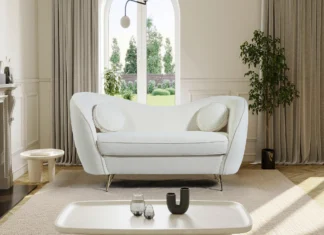Have you considered painting your ceiling the same shade as your walls? Are you confused if it will really make the room appear larger or if it’s simply too much of the same hue in one area?
Using a dark color on the ceiling after choosing a dark hue for the walls is a rather daring choice. On the other hand, white is always a safe color choice, even with white walls but there are situations when you might want to utilize color on the ceiling.
So how do you decide if you should paint the ceiling, and walls, and trim the same color? Without viewing your specific area, we can’t give you a definitive answer one way or the other, but we can provide you some facts to make the decision-making process easier.
The advantages and disadvantages of painting your ceiling the same color as your walls will be discussed.
Pros and Cons of Painting Ceiling same color as walls
Let’s check out the first pros of painting the ceiling same color as walls.
Pros of Painting Walls and Ceiling Same Color
Choosing dark colors for your walls and ceiling can be a risky decision. However, it offers a lot of design advantages in the appropriate location.
Choosing the same color to paint your ceiling as your walls has the following benefits.
It makes your ceilings look higher
A wonderful technique to achieve your aim of making your ceilings appear higher is to paint your walls and ceilings the same color. If your walls already have crown molding, this approach works even better. It produces a smooth appearance that pulls the eye forward.
However, light paint colors work best for this. Lighter hues provide the appearance of a larger area because they reflect natural light more effectively.
Makes angled ceilings look less choppy
It suffices to say that angled ceilings might seem choppy, especially if they are low. Paint your wall and angled ceiling the same color to produce a unified look that will hide the jagged ceiling.
Makes large rooms feel cozier
The same color on the walls and ceiling will make a large, empty room feel cozier. Dark paint works well for this appearance.
Helps avoid clashing undertones
If you’ve ever looked for white paint, you know how difficult it is to find one that complements every paint tone. mostly because there aren’t many real whites. Instead, they frequently seem yellow or pink once they are on the wall or ceiling.
There is nothing to be concerned about conflicting undertones to paint ceiling same as walls. It acts as a background for additional features.
It creates a backdrop for other features
Painting your walls and ceilings with a contrasting hue might help an element in your space stand out if you’re seeking for a technique to achieve that.
For instance, to make your magnificent oak flooring stand out, paint your walls and ceilings a rich blue color. Or, to make the flooring look even more warm-toned, you might choose a complimentary hue like red.
It’s quicker
It is quicker and simpler to paint the ceiling the same color as the walls. Not having to tape off the ceiling or change colors is not a concern. Additionally, creating touch-ups will be simple.
Cons of Painting Your Ceiling the Same Shade as the Walls
Even if painting your walls and ceilings the same color has advantages, there are other reasons to avoid this appearance.
Here are the cons.
It can make a room look smaller
If your room has little natural light and you wish to paint it a dark hue, doing so will make the space look smaller. Naturally, this doesn’t pose a significant problem in big spaces, but it does if you’re attempting to create the reverse effect.
Bold colors can be overwhelming
It’s a daring appearance to paint your ceiling and walls the same color. The tone-on-tone color scheme might therefore soon wear you out or overwhelm you if you tend to make more safe design choices. A place might feel more overpowering the stronger the color you pick.
Potentially Low Contrast
Every effective design needs contrast. Therefore, your furniture and flooring should provide some contrast if you choose to paint the wall and ceiling the same color. If not, your space will feel incredibly chilly and lifeless.
Will Tone Down Your Molding
Painting your room’s moulding the same shade as the walls and ceiling will soften it if you like the way it looks now. Your moulding won’t stick out as much, however this isn’t always a negative thing.
It May Highlight Ceiling Imperfections
The typical flat white ceiling paint is quite effective at hiding ceiling flaws. However, using a deeper hue, particularly one with a glossier finish, may draw attention to trouble spots in your ceiling.
TIPS
Paint the trim, ceilings, and walls all the same color. After all, it’s just painting, and if you don’t like the way it appears, you can alter the color.
Here are a few tips and suggestions.
- Installing crown moulding before painting can make your ceilings appear taller. Next, apply the same color to the walls, ceilings, and crown moulding.
- Don’t paint a room dark if it doesn’t have any natural light. Your room will appear smaller and more cavelike if you do this. Choose lighter paint colors instead.
- As noted before, white paint is rarely ever a true white. So, if you want to paint your walls and ceilings white, use the same color. If you don’t, you may end up with a yellowy white on the walls and a pinkish white on the ceilings.
However, switching sheens is acceptable. If you want to conceal flaws in your ceiling, for instance, you may use flat paint.
Final Thoughts
You may assist to make your room look attractive by painting walls and ceiling same color. A darker color choice can make a bigger area seem intimate, whereas a brighter one will enlarge a small space.
Another wonderful approach to hiding awkwardly angled ceilings and giving your room a continuous appearance is to paint your walls and ceilings the same color.













